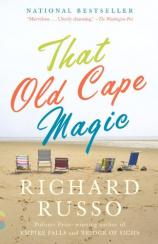Interview: June 1, 2010
Question: Apparently there is a wedding phenomenon you have termed "Table 17". What exactly is that and how does it relate to this novel?
Richard Russo: A few years ago my wife and I were invited to a wedding and were seated at what was clearly a "leftover" table. It reminded me of the final teams who get into the NCAA tournament. You can tell by their seeding that they were the last ones in, that they almost didn't make the grade. Table 17 works thematically in the novel because being among strangers, not sure whether you belong, may be the main character's future if he can't find a way to slow his downward spiral.
Q: You have said that THAT OLD CAPE MAGICbegan as a short story. What was the moment you knew it was calling out to be a novel?
RR: Griffin, my main character, begins the story on his way to a wedding with his father's urn in the trunk of his car. I planned for him to scatter the ashes (his past), put his future in danger at the wedding (his present) and then pull back from disaster at the last moment. But then he pulled over to the side of the road in his convertible to take a phone call from his mother, at the end of which a seagull shits on him. At that moment, in part because Griffin blames her, he and I both had a sinking feeling. You can resolve thematic issues of past, present and future in a twenty page story, but if you allow a shitting seagull into it, you’ve suddenly moved on to something much larger.
Q: Why did you choose the Cape?
RR: For some time I've been fascinated with the idea of "a finer place" (see Lucy Lynch and Bobby Marconi in BRIDGE OF SIGHS). I'm talking about both fiction and real life. Why do people believe that happiness is more likely to find you in one place than another? It has something with what you can and can't afford, what you think you'll one day be able to swing if things go well. Except that even when they go well, you discover it's still unaffordable, which gives the desired place a magical quality. The faster you run toward it, the faster it runs away from you. I chose the Cape because it's always been expensive and just keeps getting more so, but it could have been any number of similar places. For Griffin's parents, two academics, a house on the Cape would have always been just beyond their reach. One of their many dubious genetic gifts to Griffin is a sense that happiness is always on the horizon, never where you're standing. Very American, I think.
Q: THAT OLD CAPE MAGIC is book ended by two weddings and becomes the story of Griffin's own marriage as well as that of his parents and the impending one of his daughter. Is there some loaded charge to weddings that unleashes the past and threatens the future in a way unlike other events? Or, in other words, what were you up to in framing your story with two weddings?
RR: It probably won't surprise readers to discover that both my daughters were married during the time I was writing this book, which, if it does well, will pay for their weddings. One of our girls was married in London, which except for the expense made things easier on my wife and me. Living in the states, how much could we really be blamed for things that went wrong so far from home? Our other daughter was married in the coastal Maine town where we live, and her wedding was therefore larger. My wife and I feared that our families, who were largely unknown to each other and living on opposite sides of the country (not to mention the political spectrum), might be fissionable. Mostly we feared for the family of the groom, and maybe even the town, since we hoped to continue living there.
In the second wedding of THAT OLD CAPE MAGIC I imagined an absolutely catastrophic wedding in hopes it might act as a talisman against real-life disaster, which it appears to have done. Planning your children's weddings also gets you thinking back to your own and making the inevitable comparisons. My wife and I were grad-student poor when we got married in Tucson, and our parents were only marginally better off. Our honeymoon was four days in Mexico. We'd booked the sleeper car but managed to arrive late, actually jumping onto the moving train. They'd given our sleeper to someone else and we had to sit in the aisles on our luggage for several hours until seats became available. Neither of us got a wink of sleep and, naturally, when we arrived in Mazatlan early the next morning, our room wasn't ready. We changed into bathing suits, went to the beach and immediately fell asleep under the brutal tropical sun. By the time we woke up we were burned so badly we couldn't touch each other for the rest of the trip. But we were young and the tacos were good and so was the tequila and we'd brought plenty of books and we talked about our future and who we'd be in that future, and pretty damn quick it was thirty-five years later. That's just about how long the Griffins have been married when THAT OLD CAPE MAGIC opens.
Q: Griffin's parents, both academics trapped in what they call the "mid f***ing west," are such wonderful, sometimes maddening, often hilarious, always surprising characters. You've mined the satiric potential of academia before, most notably in STRAIGHT MAN. Have you been longing to go back there?
RR: I thought I'd got all the academic satire out of my system with STRAIGHT MAN, but apparently not. Actually, since writing that novel I've entered another world --- movie making --- that would be equally idiotic except that instead of academic scrip it involves real money. In this novel, because Griffin's a former screenwriter, I got to compare lunacies. It wasn't a fair fight, of course. Academics are really the only ones in their weight class (heavy).
Q: At the start of the novel Griffin is a man in his mid fifties who seemingly has everything going for him, a great marriage, a great daughter, the career he aspired to, basically everything he had on his wish list when first venturing out in adulthood. Then, within a year, he watches it all come unglued. It’s amazing how quickly that can happen, no?
RR: That's the other similarity between this book and STRAIGHT MAN. In both novels we watch men who are tenured in life. Safe, in other words. But there's just this one little thread on the sweater. You know you should clip it, not pull it, but there are no scissors at hand and what's the worst that can happen? The answer to that question, in this instance, is THAT OLD CAPE MAGIC.
Q: Have you actually ever been to a wedding where a guest was trapped in a tree?
RR: I myself have never been to a wedding where a guest got stuck in a tree, but we're attending a wedding on the Cape this summer and I have high hopes.




